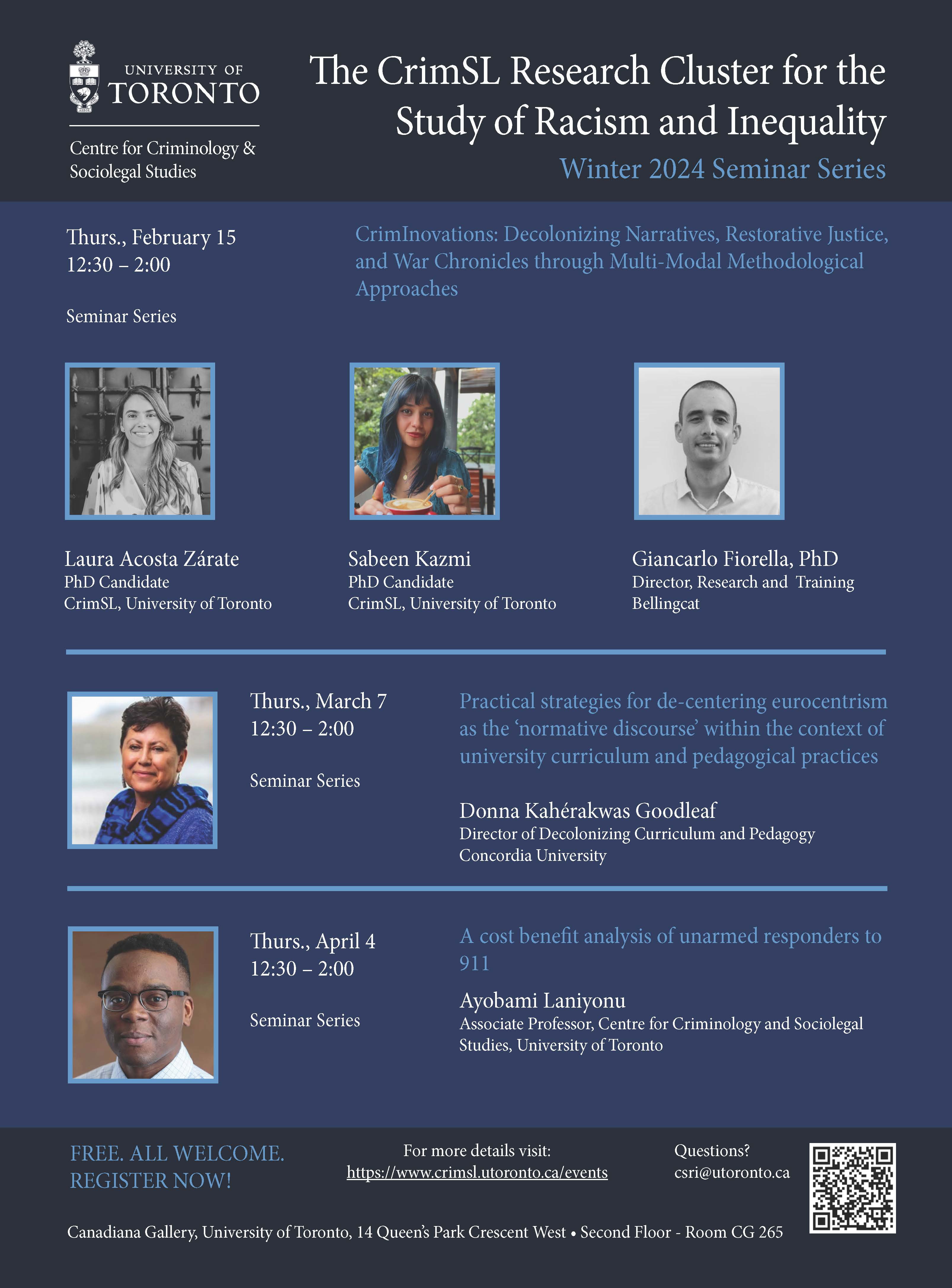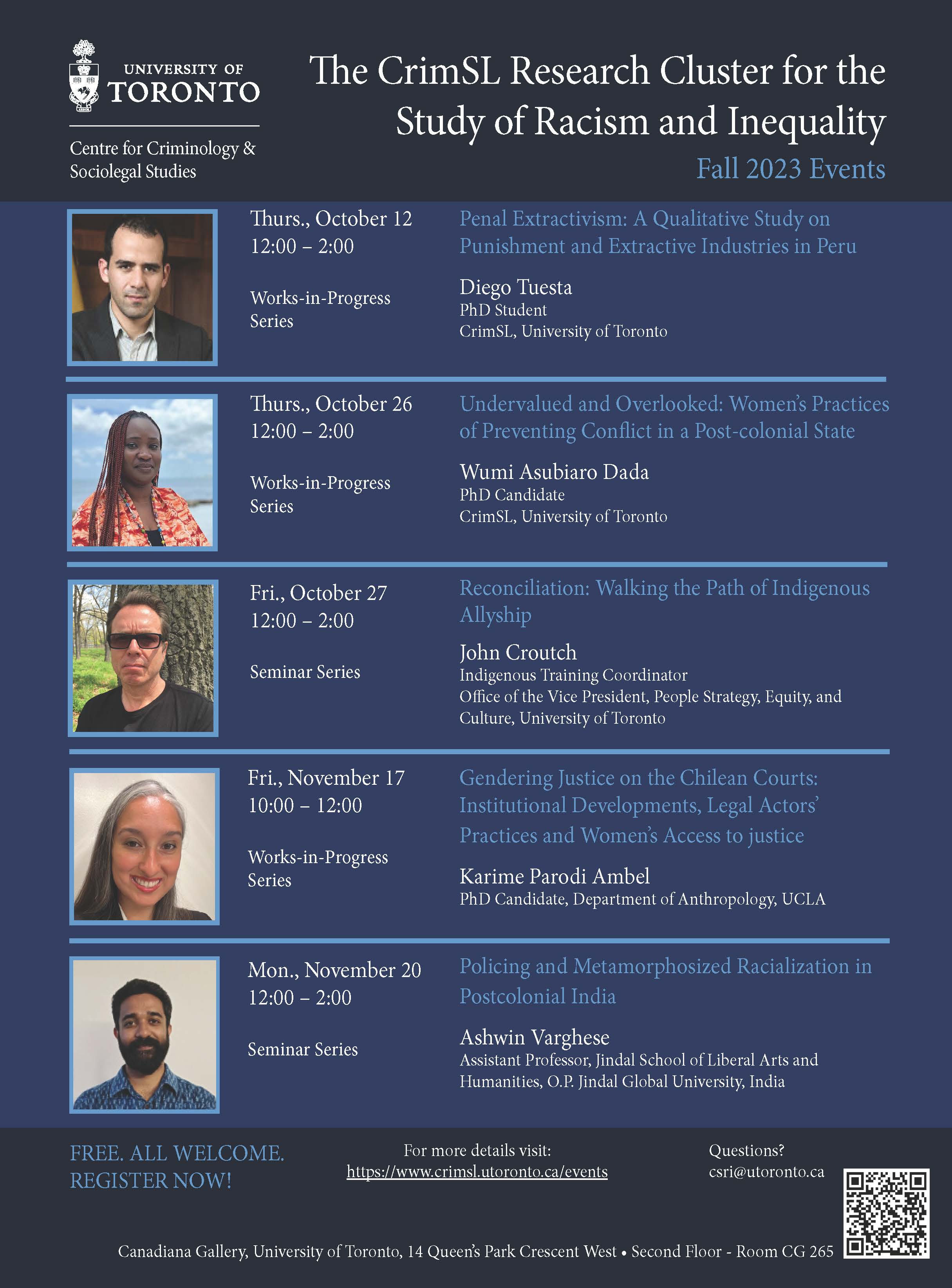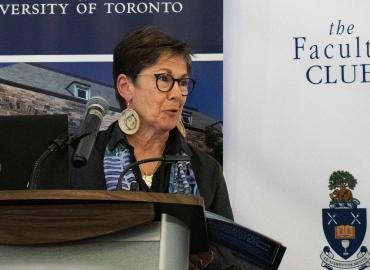2024-2025 Advisory Committee
- Beatrice Jauregui (Chair)
- Sara Ali
- Julius Haag
- Joana Jabson
- Gail Super
- Diego Tuesta
- Kamari Clarke (ex officio)
Administrative Assistant
Contact us
Email us at csri@utoronto.ca.
The legacies of racism and colonialism, and various manifestations of structural inequality, continue to shape this present moment. From the recent identification of hundreds of unmarked graves in Canadian residential schools for Indigenous people; to the rising police violence that led to the killing of George Floyd and the expansion of the Black Lives Matter (BLM)social movement; to the increasing incarceration rates and health disparities of Black, Indigenous, and People of Color (BIPOC), and the rising violence against transgender people, these issues and more continue to directly impact BIPOC peoples’ access to education, employment, financial resources, and other forms of support, as well as various networking and community building opportunities. These issues shape scholarly research and other forms of knowledge production, and are manifest in various settings, including at the University of Toronto Centre for Criminology and Sociolegal Studies (CrimSL), where racist and sexist microaggressions against BIPOC students have occurred. These incidents were not addressed in a satisfactory manner, and reflect historical deficiencies related to a broader failure of CrimSL, the University of Toronto, and other academic institutions to invest in research related to systemic racism, colonialism, gendered and sexual violence, exclusion, and other forms of structural inequality.
In March 2021, CrimSL faculty proposed the creation of a Research Cluster for the Study of Racism and Inequality related to BIPOC people. This Research Cluster aims to build knowledge about the historical and ongoing legacies of racism, colonialism, gendered and sexual violence, exclusion and other forms of structural inequality by providing a research platform for interrogating the roots of social disenfranchisement. The work of this Research Cluster will begin by taking seriously the real effects of social inequality, asking:& What exactly are the problems that BIPOC communities and individuals face at CrimSL, the University of Toronto, in the Greater Toronto Area, in Ontario, Canada, and globally? What are the lasting impacts of institutional harm on BIPOC scholars and community members who participate in scholarly research? How might the work of this cluster be both similar to and distinct from other anti-racism and decolonization initiatives at the University of Toronto and beyond? And how might we work with these other initiatives to develop the knowledge needed to initiate or support necessary social transformations oriented toward equity and social justice for all? The Cluster will address these and related emergent questions guided by the following principles.
Operating principles
- Promoting and supporting rigorous research and pedagogy on how systemic racism, colonialism, gendered and sexual violence, exclusion, and other forms of structural inequality are co-configured with state and customary law and criminal justice systems, and reproduced within academic institutions and various other places in the world
- Questioning how systemic racism, colonialism, gendered and sexual violence, exclusion, and other forms of structural inequality continue to shape scholarly knowledge production and demean other forms of knowledge at CrimSL, throughout the University of Toronto, and beyond. Through this process we commit to creating pathways to reshape how we conceptualize knowledge building/keeping, “competencies,” “excellence”, and timely research “progress”
- Creating an inclusive environment for sharing ideas that center and celebrate BIPOC people, and their complex identities and experiences, in a wholistic manner informed by anti-racist, anti-oppressive, anti-colonial praxis
- Challenging the historical distinction between political activism and scholarship in all aspects of academic life, including but not limited to admissions and hiring, program administration, community governance, and the conduct of research. Toward this end we are committed to building equitable community partnerships that inform and are impacted by research related to issues of systemic racism, colonialism, gendered and sexual violence, exclusion, and other forms of structural inequality
- Increasing representation of and supporting professionalization of BIPOC knowledge builders/keepers within and outside of the academy
The Cluster Advisory Committee has developed a five-year plan with four primary goals.
Goals
- Openly supporting and actively encouraging historically underrepresented critical scholarship on the workings of racism, colonialism, gendered and sexual violence, exclusion and other forms of structural inequality, particularly in the criminal justice system and other political and legal arenas
- Providing seed funding for research on and by BIPOC people and how their lives and worlds have been and continue to be shaped by systemic racism, colonialism, gendered and sexual violence, exclusion, and other forms of structural inequality
- Reviewing and redefining CrimSL pedagogy on systemic racism, colonialism, gendered and sexual violence, exclusion, and other forms of structural inequality, including but not limited to developing at least one dedicated course for students interested in pursuing these issues, which could also serve as a forum for developing engaged community partnerships and learning from knowledge keepers outside the academy
- Providing mentoring, institutional support, and various resources for BIPOC students and faculty to address ongoing structural inequalities and promote social change
Since 2022, the Research Cluster for The Study of Racism and Inequality has funded projects that are concerned with how systemic racism, colonialism, gendered and sexual violence, exclusion, and other forms of structural inequality shape knowledge production and everyday life on multiple scales.
See ![]() Call for Proposals - General Information.
Call for Proposals - General Information.
PROJECT TITLE |
PROJECT LEAD ORGANIZATION(S) |
NAME(S) |
DATE OF AWARD |
| Rethinking Power, Agency and Choice: Women’s Role in Nigerian Conflict | Centre for Law Enforcement and Education Foundation (CLEEN), Centre for Democracy and Development (CDD), Early Warning Early Response Project (EWER) | Asubiaro Dada, Wumi | 2022-01 |
| African Nova Scotian Perceptions of the Police in Urban Nova Scotia | CrimSL | Bundy, Jessica | 2022-01 |
| Debunk the Model Minority Stereotype: Lived- experiences and Narratives of East-Asian Minorities in the Canadian context | CrimSL | Choi, Amy | 2022-01 |
| Transformative Justice Within Academia: A Radical Institutional Reflection | CrimSL | Kazmi, Sabeen | 2022-01 |
| Variations in Punishment: An Analysis on the Racialized Experiences of Probationers in the Canadian Context | CrimSL | Ruel, Maya | 2022-01 |
| The postcolonial criminalization of indigenous communities in the context of mining conflicts in South America. An analytical framework based on the case of Espinar, Peru | CrimSL, Pontificia Universidad Católica del Perú (Social Sciences) | Tuesta Reategui, Diego | 2022-01 |
| Brushstrokes of Restoration: Painting the War, Sharing, Healing, and Making Us Visible | U of T | Acosta Zarate, Laura | 2023-10 |
| Ethics Review Board formation | Walls to Bridges | Eldrige, Tiina; Simone Weil Davis, Lorraine Pinnock | 2023-10 |
| Drawing Out Colonial Legacies art exhibition | CrimSL | Kazmi, Sabeen | 2023-10 |
| Ciucad Civil Housing Project | CrimSL | Radosh Sverdlin, Adina and Jacqueline Guttierez | 2023-10 |
| A Critical Understanding of Indigenous Policing in Mohawk Nation Territory, Akwesasne | CrimSL | Shlapak, Roksolyana | 2023-10 |
| Penal Violence in Spaces of Rural Precarity | U of T | Super, Gail | 2024-04 |
| From Punishment to Public Health: Addressing the Toxic Drug Crisis in Northern Ontario | CrimSL | Fruchtman, Sara | 2024-03 |
| Silenced Voices: The Impact of Terrorism Designations on Palestinian Advocacy in Canada | U of T | Paz, Alejandro and Basema Al Alami | 2024-05 |
| Knowledge Mobilization with Black & Racialized Communities on the topic of Use-of-Force | McMaster University, School of Social Work | Damptey, Kojo | 2025-02 |
| Systemic and Institutional Anti-Palestinian Racism in Greater Toronto and Hamilton Area Public School System | U of T, Women and Gender Studies Institute; Department of Sociology, Trent University; Faculty of Education, Concordia University of Edmonton; Institute for the Study of University Pedagogy, University of Toronto | Hasan, Wafaa (lead), Nadiya Ali, Muna Saleh, Sheliza Ibrahim | 2025-02 |
| Get to Know Your River Is Indigenous Research: Decolonizing Municipal and Provincial Bylaws, Building Relations with Ziibii (the Credit River) | U of T, New College, Women and Gender Studies Institute | Giidaakunadaad Nancy Rowe and Bonnie McElhinny | 2025-02 |
| Healthcare discrimination and access issues for Black and Indigenous people experiencing homelessness | University of Northen British Columbia, School of Health Sciences | Wilkinson, Ashley | 2025-02 |
CrimSL PhD student Ravita Surajbali has been named the 2022 Research Fellow of the Research Cluster for the Study of Racism and Inequality.
Ravita researches the institutional governance of campus sexual violence in Canada, focusing on risk and actuarial governance. She works as a Planning and Program Evaluation Specialist within the Sexual Violence Prevention and Response Office (SVPRO) at the University of Waterloo. In this role, Ravita develops evaluation strategies to assess the effectiveness of campus sexual violence interventions, including policy, training, and on and off-campus programming. She is passionate about conducting research that can help advance equity in higher education – through research, evaluation, pedagogy, and institutional practice. Ravita will be establishing a database that presents information on institutional initiatives by post-secondary institutions in Canada that address systemic racism and inequality.
Research for the database will be conducted using mixed-methods – Ravita will synthesize findings from the following research tasks.
- A literature review, including scholarly and grey literature, on anti-racist, anti-colonial, and anti-oppressive programming in higher education – identifying trends, best-practices, and key findings from evaluation research.An inventory of university-initiated initiatives (research projects, clusters, working groups, communities of practice) centered around equity, diversity, inclusion, and anti-racism in Canada.An inventory of the presence, approach (guiding principles, commitments, frameworks), and institutional capacity (funding, resourcing, staff) of equity, diversity, inclusion, and anti-racism offices at post-secondary institutions in Canada.
- A content analysis of institutional policies or inter-institutional charters that address anti-black racism, anti-Indigenous racism, and systemic barriers to equity and inclusion across post-secondary institutions in Canada.
- An inventory of the programming, training, education, and awareness-raising initiatives offered by offices at post-secondary institutions that address anti-racism and structural inequality – categorized by type (subject matter/issue), purpose, format/delivery, target population(s), and intended outcome(s).
- A logic model and evaluation plan that can assess institutional initiatives on anti-racism and structural inequality, both research and praxis-oriented.
- Qualitative findings from interviews with institutional stakeholders across Canadian post-secondary institutions who (1) develop institutional initiatives addressing anti-racism and structural inequality; (2) deliver such initiatives; and (3) evaluate such initiatives.
Cluster Research Fellowship / Call for Applications 2022
The CrimSL Research Cluster for the Study of Racism and Inequality proudly presents two series of events for the students, faculty, staff, and the University community. Attendance at all CrimSL Research Cluster events is free, however, registration is required. Please visit https://www.crimsl.utoronto.ca/events for more details and to register for individual Cluster events.
- The Research Cluster Speaker Series lectures bring scholars and professionals who are exploring, investigating, and working on subjects of racism, inequality, and other related topics.
- The Works-in-Progress Series showcases the current works of up-and-coming scholars with a focus on the CrimSL Research Cluster’s values and topics of interest.
2024-25 Research Cluster Events
- October 8, 2024. 6:00 pm to 8:00 pm. National Townhall on Canada's Black Justice Strategy. Co-presented with the Black Opportunity Fund, the Canadian Race Relations Foundation, and U of T’s Victoria University and Black Research Network. Speakers: Zilla Jones, Akwasi Owusu-Bempah, Myrna Lashley, DeRico Symonds, Dunia Nur, Craig Wellington. Event recap.
- November 20, 2024. 12:30 pm to 2:00 pm. Reimagining Community Safety. Moderator: Sara Ali. Speakers: Sara Fruchtman, Roxy Shlapak, and Adina Radosh Sverdlin.
- February 11, 2025. 12:30 pm to 2:00 pm. Silenced Voices: The Impact of Terrorism Designations on Palestinian Advocacy in Canada. Co-sponsored by Hearing Palestine. Speakers: Basema Al-Alami, doctoral candidate, U of T Law; Prof. Fahad Ahmad, Criminology, TMU (panellist); Prof. Kent Roach, U of T Law (panellist); Prof. Sonya Fatah, TMU School of Journalism (panellist); Prof. Beatrice Jauregui, U of T, CrimSL (co-moderator); Prof. Alejandro Paz, UTSC Anthropology (co-moderator).
- April 2, 2025. 11:00 am to 1:00 pm. The Fabrication of Homeland Security: Tracing Police Entanglements Across India and Israel/Palestine. Co-presented with U of T Geography & Planning and CrimSL. Rhys Machold, University of Glasgow. Co-sponsored by U of T Geography & Planning and the CrimSL Speaker Series.
- April 3, 2025. 12:30 pm to 2:00 pm. Exploring Coercion, Caste, and Labour in the Indian Army through Swadesh Deepak's 'Court Martial'. Taveeshi Singh, postdoctoral fellow, CrimSL.
- April 30, 2025. 12:30 pm to 2:00 pm. Penal Violence in Spaces of Rural Precarity (South Africa) with Gail Super, Professor of Sociology, University of Toronto.

2023-24 Research Cluster Event Series
- Thursday, February 15, 2024. 12:30 pm to 2:00 pm. CrimInovations: Decolonizing Narratives, Restorative Justice, and War Chronicles through Multi-Modal Methodological Approaches with Sabeen Kazmi, Laura Acosta Zárate, and Giancarlo Fiorella.
- Thursday, March 7, 2024. 12:30 pm to 2:00 pm. Practical Strategies for de-centering eurocentrism as the ‘normative discourse’ within the context of university curriculum and pedagogical practices with Kahérakwas Donna Goodleaf.
- Thursday, April 4, 2024. 12:30 pm to 2:00 pm. A cost benefit analysis of unarmed responders to 911 with Ayobami Laniyonu.
- Thursday, May 09, 2024 12:00 pm to 2:00 pm. The school-to-prison pipeline: criminalizing Black students here and abroad. Speakers Montel Gordon, marcus singleton, Kearie Daniel.

Previous events
 Please visit https://www.crimsl.utoronto.ca/events for more details and to register for individual Cluster events. We hope to see you there!
Please visit https://www.crimsl.utoronto.ca/events for more details and to register for individual Cluster events. We hope to see you there!





